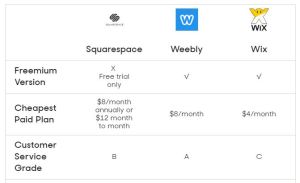This is the fourth, and last (at least for now) part of our series of posts on Small Business Website Basics. When I began working on this topic, I had no idea just how much information there was to consider when beginning work on a website to represent your small business to the world. ‘An’ article grew into two articles, then three, now a fourth. If you missed any of the previous articles, you can link to them below:
Small Business Website Basics – Part 1: A Small Business Website is Not an Option
Small Business Website Basics – Part 2: What does a Small Business Website Cost?
Small Business Website Basics – Part 3: What to Include on a Small Business Website
Disclaimer: I would be remiss to let my small business readers think that I recommend or support a DIY approach to website design. I do not. The importance of a website as the hub of your online marketing plan suggests that you should have qualified website designers and developers work with you at a price your budget can afford. A good website needs to do more than look good. The aesthetic is one element, but knowledge and skills related to successful marketing, Search Engine Optimization (SEO) and web design and development skills are equally important. I share this article with you as a last ditch approach to having ‘some’ website online vs. not having one at all.
Your Small Business Website: DIY vs Don’t DIY

Many small business owners think that they can get all the attention they need, and provide all the information necessary through social media sites like FaceBook. After all, “everyone” is on FaceBook. Maybe they are, maybe they aren’t. A small business should be interested in only the right people – those who will become paying customers. The trick is, how do you find the right people among the millions, interested in becoming your customer? You want to connect to ideal customers for your company products and services, not the masses.
There is more to attracting prospects who will become customers than just being visible on social media sites and posting regularly. How do you find the right people – those interested in what you are selling or what services you provide? FB is a great place to stay in touch with family, friends, and colleagues, plan reunions with former classmates and post pictures of your cute grandchildren and pets. But, are any of them going to be your customers?
Will you post the type and quantity of information it takes to gain attention from a customer perspective? Are you able, on your own, to attract prospects, engage them and move them forward to becoming not just a paying customer, but a repeat customer who will tell the world how wonderful they are? Yes, Facebook allows for a business ‘Page’ where you can feature only your business. Unfortunately, many times friends and colleagues can cross blurred lines between your ‘friends’ page and your ‘business’ page. Keeping ‘friends’ from junking up your site with games, jokes, pet videos and political statements can be difficult to control.
Limited funds often force entrepreneurs to look for ways to allocate what money they have available to get the most value for their expenditures. Nothing wrong with getting the most bang for your buck. But, cheap is not always the best way to get value. Far too many start-ups and even more established small businesses think that just because there is website building software out there, they can use it to make a website that’s the way to go – Do It Yourself.
Do-It-Yourself isn’t necessarily the best way to go with something as important as a small business website. In a business environment that operates in an Internet world, a web presence is critical to your company’s success. Just throwing something online with no knowledge of the formula that will make it useful at converting visitors into customers can be an effort in futility.
How often have you commented on how people think they know how to do what you specialize in, but they really don’t have the skills or education? Have you become one of those people when it comes to your web presence? There are skilled and talented professionals who create beautiful and successful web sites for a living. They are professionals with the skills, education and experience necessary to create an aesthetically pleasing site – that works. They also have skills to provide superior copywriting that will help your site show up on page one or two in search engine results. They know which keywords to include in the page text – and where – and images that will attract the best visitors to your site.
Website professionals know how to attract ideal customers who are looking for exactly what you are selling. They know the importance of calls-to-action to move visitors through measured steps of your website buying/selling process. They are far more than just designers or developers. They are seasoned marketers and search engine optimization specialists. They have coding skills to make your site look more professional than a cut-and-paste effort. They know why some things should be included on your site and why others should be left out. They know what customers look for and how to best present your abilities to solve their problems.
Someone with just skills to create a small business web site from a technical perspective doesn’t necessarily understand the broad marketing picture. They may not have copy writing skills or how to make SEO work for you. Knowledge of marketing, search engine optimization (SEO) and the psychology of Internet selling and marketing channels are all important factors to be considered.
From the DIY Small Business Website Perspective:
“If you insist…” on taking the DIY approach after these past few postings on building your small business website, I feel compelled to offer something from that perspective. There are at least several dozen different website building programs available today. Some are free, others are not. Many are of the cut-and-paste variety, others a bit more difficult. Some have a significant learning curve to become skilled enough to build your own site. Platforms like WordPress are pretty easy to use, but have some areas that may need outside skilled help. It depends on what you want your site to look like and do.
To recommend any one program and assume it would be the best for everyone would be foolish. For that reason, I am referring you to a great article by an impressive team of researchers, writers, editors and designers from www.Reviews.com who prepare in depth reviews of entire categories, not just individual products to find the best of the best. Their goal is to help consumers make purchasing decisions based on research.
It happens that Reviews.com did research into website building software recently. I’m not talking about some quick article about research into two or three software programs. The Reviews.com team reviewed 41 – yes 41 – programs to come up with the best options available. They read reviews and guides and surveyed more than 400 people and talked with nine web marketing professionals.
Based on their research, the team feels only a few of the programs for building websites are worth trying. Three website builder platforms that made the final cut were: Squarespace, Weebly and Wix. The team felt that all three offer “well-built, responsive templates and integrated blogging and e-commerce features”. They covered a number of other platforms too, but these were at the top of their ‘Best’ list.
Think of beginning a small business website project like a box full of puzzle pieces. When you put all the puzzle pieces together, the end result is a beautiful landscape, some impressive architecture or an adorable animal. That is the goal of developing a small business website – a perfect vision of your successful company. All of the right pieces aligned in the right places and directions to present the perfect message to ideal customers.
In a perfect world, all of your marketing elements will work together to achieve your specific vision. Under the best of circumstances, your site will be strategically filled with the right keywords to attract those ideal customers you have been looking for. Ideally, your website will turn up on at the top of the first page of search results. Ideally, your well written marketing messages will sing out to prospects, grabbing their interest and reeling them in. Ideally, perfect calls-to-action will be strategically placed where they will catch a prospect’s attention. Once noticed, they encourage visitors to move to the next step of your conversion process. Ideally, you will develop and build your website based on strategy. The last thing you want is to repeat what you’ve seen on other small business websites.
Wishing you an ideal world in getting messages about your company to customers anxious to find the ideal company to solve their problems. You need not take a ‘one and done’ approach to your site. As funds become available, add additional pages and information to your site to make it work better for you. Don’t short change yourself or your small business. Invest where it is important – like on a professional, high-quality small business website.






